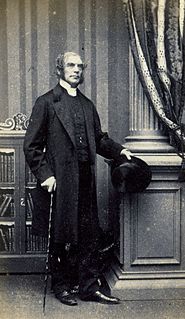A Quote by Philip Yancey
Why pray? Evidently, God likes to be asked. God certainly does not need our wisdom or our knowledge, nor even the information contained in our prayers ("your Father knows what you need before you ask him"). But by inviting us into the partnership of creation, God also invites us into relationship. God is love, said the apostle John. God does not merely have love or feel love. God is love and cannot not love. As such, God yearns for relationship with the creatures made in his image.
Quote Topics
Related Quotes
Man depends on God for all things: God depends on man for one. Without man's love God does not exist as God, only as creator, and love is the one thing no one, not even God himself, can command. It is a free gift or it is nothing. And it is most itself, most free, when it is offered in spite of suffering, of injustice, and of death . . . The justification of the injustice of the universe is not our blind acceptance of God's inexplicable will, nor our trust in God's love, his dark and incomprehensible love, for us, but our human love, notwithstanding anything, for him.
God’s love sets us free from the need to seek approval. Knowing that we are loved by God, accepted by God, approved by God, and that we are new creations in Christ empowers us to reject self-rejection and embrace a healthy self-love. Being secure in God’s love for us, our love for Him, and our love for ourselves, prepares us to fulfill the second greatest commandment: To love our neighbor as ourselves.
God will never disappoint us… If deep in our hearts we suspect that God does not love us and cannot manage our affairs as well as we can, we certainly will not submit to His discipline. …To the unbeliever the fact of suffering only convinces him that God is not to be trusted, does not love us. To the believer, the opposite is true.
There are two gods. The god our teachers teach us about, and the God who teaches us. The god about whom people usually talk, and the God who talks to us. The god we learn to fear, and the God who speaks to us of mercy. The god who is somewhere up on high, and the God who is here in our daily lives. The god who demands punishment, and the God who forgives us our trespasses. The god who threatens us with the torments of Hell, and the God who shows us the true path.
There are two gods. A god who casts us off because of our sins, and a God who calls to us with His love.
God notices you. The fact is he can't take his eyes off of you. However badly you think of yourself, God is crazy about you. God is in love with you. Some of us even fear that someday we'll do something so bad that he won't notice us anymore. Well, let me tell you, God loves you completely. And he knew us at our worst before he ever began to love us at all. And in the love of God there are no degrees, there is only love.
Trusting God's grace means trusting God's love for us rather than our love for God. [...] Therefore our prayers should consist mainly of rousing our awareness of God's love for us rather than trying to rouse God's awareness of our love for him, like the priests of Baal on Mount Carmel (1 Kings 18:26-29).
God the Eternal Father did not give [the] first great commandment because He needs us to love Him. His power and glory are not diminished should we disregard, deny, or even defile His name. His influence and dominion extend through time and space independent of our acceptance, approval, or admiration."No, God does not need us to love Him. But oh, how we need to love God!"For what we love determines what we seek."What we seek determines what we think and do."What we think and do determines who we are—and who we will become.
Someone tells us that God loves us as a father loves his children. We are reassured. But then something awful happens. Some qualification is made.... We are reassured again. But then perhaps we ask: what is this assurance of God's (appropriately qualified) love worth, what is this apparent guarantee really a guarantee against? Just what would have to happen not merely (morally and wrongly) to tempt but also (logically and rightly) to entitle us to say "God does not love us" or even "God does not exist"?
God's unfailing love for us is an objective fact affirmed over and over in the Scriptures. It is true whether we believe it or not. Our doubts do not destroy God's love, nor does our faith create it. It originates in the very nature of God, who is love, and it flows to us through our union with His beloved Son.
The unbreakable bond between love of God and love of neighbor is emphasized. One is so closely connected to the other that to say that we love God becomes a lie if we are closed to our neighbor or hate him altogether. Saint John's words should rather be interpreted to mean that love of neighbor is a path that leads to the encounter with God, and that closing our eyes to our neighbor also blinds us to God.
You are not called to believe in your love to God, but in God's love to you! Do not argue, 'I cannot love God! I have striven to my uttermost to do so, but have failed in all my endeavors, until in despair I have abandoned the thought and relinquished the attempt.' Be it so- no effort of your own can strike a spark of love to God from your heart. Nor does God demand the task at your hands. All that He requires of you is faith in His love, as embodied and expressed in Jesus Christ to poor sinners.
God's love never ceases. Never. Though we spurn him. Ignore him. Reject him. Despise him. Disobey him. He will not change. Our evil cannot diminish his love. Our goodness cannot increase it. Our faith does not earn it any more than our stupidity jeopardizes it. God doesn't love us less if we fail or more if we succeed. God's love never ceases.
Let us pause before the Child of Bethlehem. Let us allow our hearts to be touched, let us allow ourselves to be warmed by the tenderness of God; we need his caress. God is full of love: to him be praise and glory forever! God is peace: let us ask him to help us to be peacemakers each day, in our life, in our families, in our cities and nations, in the whole world. Let us allow ourselves to be moved by God's goodness.
To be in a relationship with God is to be loved purely and furiously. And a person who thinks himself unlovable cannot be in a relationship with God because he can't accept who God is; a Being that is love. We learn that we are lovable or unlovable from other people. That is why God tells us so many times to love each other.
...it is proper that the duty of helping the poor and unfortunate should especially stir Catholics, since they are members of the Mystical Body of Christ. In this we have come to know the love of God, said John the Apostle, that He laid down His life for us, and we likewise ought to lay down our life for the brethren. He who has the goods of this world and sees his brother in need and closes his heart to him, how does the love of God abide in him? (1Jn 3:16 17)



































